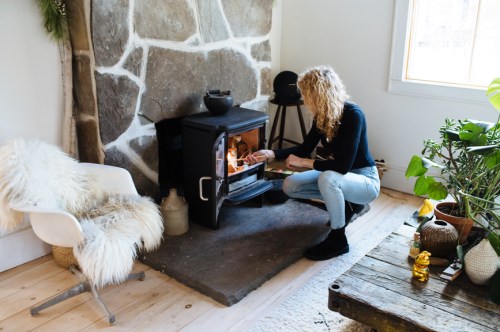Autumn is arguably the coziest time of year. Think about it: you get to break out your pumpkin spice candles, crank up the heater, and light up your fireplace (if you’re lucky enough to have one) for the first time in months. While you might be tempted to go all in on these activities without a second thought, it’s a good idea to brush up on fire safety tips and precautions at the beginning of the season—because nobody wants to start an accidental fire when you’re just trying to live your best fall life.
Experts in This Article
“The most important advice we give every year is to have working smoke alarms,” says Matt Haas, a firefighter and paramedic. “Fall is a good reminder to test and change all the batteries in the smoke alarms in your house,” he says.
Other important fire safety practices include inspecting and cleaning your wood fireplace, chimney, and wood stove pipes before using them, and keeping an eye on your furnace. In cold weather, the exhaust of high-efficiency furnaces is prone to freezing up, says Haas, so making sure no ice is blocking the exhaust is an important precaution to take. While those are some big ones, there are a few other fire safety tips to keep in mind this season.
“Most homeowners are not aware that their clothes dryer is a fire hazard.”—Russ Dimmit, director of education at the Chimney Safety Institute of America.
5 tips from fire safety experts to keep your home and everyone in it safe
1. Never leave open flames or burners unattended
It can be easy to set a pot of soup to simmer on the stove, then walk away and forget it ever existed. In fact, Haas says leaving food on the stove unattended is one of the most common causes of household fires. And that goes for candles, too. Even if you think nothing could possibly go wrong with your autumnal-scented candle, there are some variables you can’t anticipate or control—like an object falling on the candle and catching fire.
When it comes to lighting up your jack-o-lanterns, be extra mindful of keeping children away from any open flames. Better yet, take the fire risk out of the equation and use a battery-operated candle or glow stick instead, according to the National Fire Protection Association.
This is probably a no-brainer, but you’ll also want to keep any fire-starting tools out of reach of children. Kids have a way of grabbing the one thing you don’t want them to, so seriously, put it far out of reach. Finally, make sure to thoroughly extinguish any lit candles, burners, or fireplaces (even if they’re smoking) to protect your home from a potential fire.
2. Regularly test and maintain fire alarms, carbon monoxide detectors, and heating appliances
As mentioned, fire alarms are your main defense against household fires. So, checking that they are working and replacing batteries when needed is super important, says Russ Dimmit, director of education at the Chimney Safety Institute of America. Yes, it can be a nuisance, but it’s better than your smoke alarm chirping in the middle of the night because you didn’t change the battery.
Add your carbon monoxide detector to the list of alarms to check, too. Carbon monoxide (CO) is an odorless, tasteless, invisible (oh, and flammable) gas that can be fatal when inhaled. That means without a detector you would have no idea if your house was full of this noxious gas.
Fireplaces and heating appliances, like dryers, can also be CO and fire hazards, says Dimmit. “Most homeowners are not aware that their clothes dryer is a fire hazard. It is important that dryer ducts and dryers are cleaned and inspected annually to reduce the chance of fires,” he says. The same goes for chimneys—make sure it’s cleaned and maintained annually to prevent a problem.
3. Have home fire safety guidelines, an escape plan, and quarterly drills
One major gap that Haas sees in fire safety at home is having an established and practiced fire safety escape plan. Important tip: Make sure you have access to your windows and exits at all times—this means that you should remove your window AC unit if there is only one window in the room, and make sure your doors are accessible and unlikely to be blocked. Not sure what else to consider? You can use the National Fire Protection Association’s guide to help you develop an emergency escape plan.
Fire drills are common in schools and should be just as common at home, especially with children who need to be educated about what to do in a fire. Repetition is key, so going through a fire safety drill at home once every few months will ensure everyone in the family is confident about what to do in an emergency.
4. Always close doors before sleeping
There is a national campaign to “close before you doze” for a reason. That’s because shutting your door before bed can very effectively prevent the spread of a household fire into a room and reduce the level of smoke. It also gives people in the room time to hear a fire alarm, wake up, and respond—instead of inhaling smoke in their sleep (which is, frankly, a matter of life and death).
5. Keep combustible items away from candles and space heaters
For people who live in a drafty home or apartment, space heaters can be really helpful in a pinch. However, a space heater can also become a fire hazard if covered in dust or if something is blocking it while it runs. Haas recommends keeping combustible items—think wood, paper, and plastic—at least 36 inches (3 ft) away from heaters. Having heaters with automatic timers, planning when you will use them, and keeping children away from them are all important fire safety practices to put in place.
One important note is that all the fire safety tips in the world won’t make a difference unless everyone you live with is on the same page. That includes roommates, partners, and children. Consider printing out a sheet with a list of precautions to hang on the refrigerator or sending out an email with a detailed escape plan. No matter how you rally around your home safety practices, know that having a plan and remembering what to do are extremely important when it comes to fire-related emergencies. Being prepared will help you rest easy so you can enjoy all the warmth of the season.
Sign Up for Our Daily Newsletter
Get all the latest in wellness, trends, food, fitness, beauty, and more delivered right to your inbox.
Got it, you've been added to our email list.











